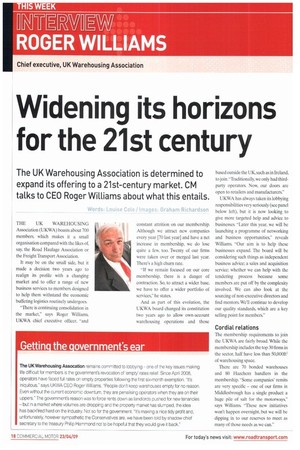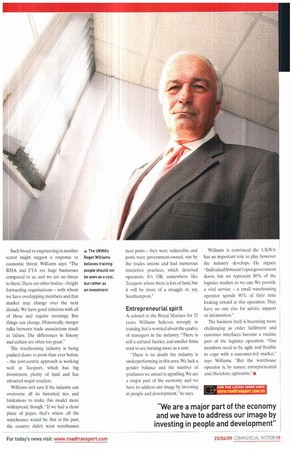Widening its horizons for the 21st century
Page 18

Page 19

If you've noticed an error in this article please click here to report it so we can fix it.
The UK Warehousing Association is determined to expand its offering to a 21st-century market. CM talks to CEO Roger Williams about what this entails.
Words: Louise Cote / Images: Graham Richardson THE UK WAREHOUSING Association (UKWA) boasts about 700 members, which makes it a small organisation compared with the likes of. say, the Road Haulage Association or the Freight Transport Association.
It may be on the small side, but it made a decision two years ago to realign its profile with a changing market and to offer a range of new business services to members designed to help them withstand the economic buffeting logistics routinely undergoes.
"There is continuing consolidation in the market," says Roger Williams, UKWA chief executive officer, -and constant attrition on our membership. Although we attract new companies every year [70 last year] and have a net increase in membership, we do lose quite a few. too. Twenty of our firms were taken over or merged last year. There's a high churn rate.
"If we remain focused on our core membership, there is a danger of contraction. So, to attract a wider base. we have to offer a wider portfolio of services," he states.
And as part of this evolution, the UKWA board changed its constitution Iwo years ago to allow own-account warehousing operations and those based outside the UK, such as in Ireland, to join. "Traditionally, we only had thirdparty operators. Now, our doors are open to retailers and manufacturers."
UKWA has always taken its lobbying responsibilities very seriously (see panel below left), but it is now looking to give more targeted help and advice to businesses. -Later this year. we will be launching a programme of networking and business opportunities," reveals Williams. "Our aim is to help these businesses expand. The board will be considering such things as independent business advice; a sales and acquisition service: whether we can help with the tendering process because some members are put off by the complexity involved. We can also look at the sourcing of non-executive directors and find mentors. We'll continue to develop our quality standards, which are a key selling point for members."
Cordial relations
The membership requirements to join the UKWA are fairly broad. While the membership includes the top 30 firms in the sector. half have less than 50,000ft2 of warehousing space.
There are 70 bonded warehouses and 80 Hazehem handlers in the membership. "Some companies' remits are very specific one of our firms in Middlesbrough has a single product: a huge pile of salt for the motorways," says Williams "These new initiatives won't happen overnight, but we will be dipping in to our reserves to meet as many of those needs as we can." Such broad re-engineering in another sector might suggest a response to economic threat. Williams says: "The RHA and FTA are huge businesses compared to us, and we are no threat to them.There are other bodies—freight forwarding organisations — with whom we have overlapping members and that market may change over the next decade. We have good relations with all of these and regular meetings. But things can change. Historically, merger talks between trade associations result in failure. The differences in history and culture are often too great."
The warehousing industry is being pushed closer to ports than ever before — the port-centric approach is working well at Teesport, which has big investment, plenty of land and has attracted major retailers.
Williams isn't sure if the industry can overcome all its historical tics and limitations to make this model more widespread, though. "If we had a clean piece of paper, that's where all the warehouses would be. But in the past, the country didn't want warehouses near ports — they were vulnerable, and ports were government-owned, run by the trades unions and had numerous restrictive practices, which deterred operators. It's OK somewhere like Teesport, where there is lots of land, but it will be more of a struggle at, say, Southampton."
Entrepreneurial spirit
A colonel in the Royal Marines for 32 years, Williams believes strongly in training, but is worried about the quality of managers in the industry. "There is still a cultural barrier, and smaller firms tend to see training more as a cost.
"There is no doubt the industry is underperforming in this area. We lack a gender balance and the number of graduates we attract is appalling. We are a major part of the economy and we have to address our image by investing in people and development." he says. Williams is convinced the UKWA has an important role to play however the industry develops. He argues: "Individual firms can't open government doors, but we represent 80% of the logistics market, so we can. We provide a vital service — a small warehousing operator spends 90% of their time looking inward at this operation. They have no one else for advice, support or information."
The business itself is becoming more challenging as order fulfilment and customer interfaces become a routine part of the logistics operation. "Our members need to be agile and flexible to cope with a customer-led market," says Williams. "But the warehouse operator is, by nature, entrepreneurial and, therefore, optimistic." •
amtw.roadtranspart.comicm
















































































































































